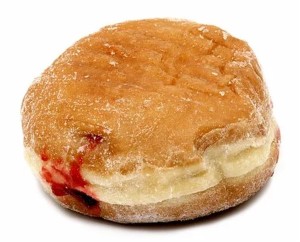Use of cheap, probably toxic or radioactive, alternatives to genuine food ingredients in Israel dates back to economic constraints of the state’s formative years.
 Jerusalem, December 12 – Patrons of a local confectionery and pastry establishment watched an employee of the business today with disgust and shock as he injected a repulsive, sugary, colored paste into rounded lumps of deep-fried dough, rendering the otherwise appealing products vomitacious.
Jerusalem, December 12 – Patrons of a local confectionery and pastry establishment watched an employee of the business today with disgust and shock as he injected a repulsive, sugary, colored paste into rounded lumps of deep-fried dough, rendering the otherwise appealing products vomitacious.
Witnesses reported Thursday that a worker at the newly-opened Nehama Bakery near the Mahane Yehuda market in the capital city’s downtown area filled almost an entire batch of donuts with a red substance that resembles strawberry jam in the loosest sense, as horrified would-be clients of the business stared in astonishment and nausea. The incident took place amid the buildup to the eight-day Jewish festival of Hanukkah, the customs of which include the consumption of fried foods.
“There was this tray of donuts fresh out of the fryer,” recalled a traumatized customer, a dazed look in his eyes. “I was waiting to see what they might put on top. It could be something simple, such a powdered sugar – you don’t mess with a good thing, you know? – or a chocolate glaze, or maybe something fancier. Even fillings are fine if you’re talking custard or somesuch. But then along comes this guy from the kitchen in back, wielding an injector, and he proceeds to…” his words faded as he recalled the incident and stared into the distance.
“It was awful,” whispered his companion. “Criminal, even. How is it not illegal to destroy perfectly good donuts with that putrid garbage? I almost fainted.”
Experts noted that the use of cheap, probably toxic or radioactive, alternatives to genuine food ingredients in Israel dates back to the state’s formative years, when economic constraints forced the vast majority of Israelis and Israeli food manufacturers to develop imitations. The use of those imitations persists in some quarters among more impoverished sectors of the society, with some elements of the phenomenon marketed as nostalgia.
“But Israel is an economic, military, and cultural powerhouse now,” observed historian Ribat Halav. “This… episode inspires so much revulsion because the very neighborhood where it took place has been undergoing a thorough gentrification in the last fifteen or twenty years, with emphasis on the culinary aspects of that trend. Some of the city’s best – if not the country’s best – food is right there, and quality expectations have risen commensurate with that. A few years ago you could walk around the downtown area and still find some of the older junk, but I could have sworn we were past that.”
Please support our work through Patreon.




